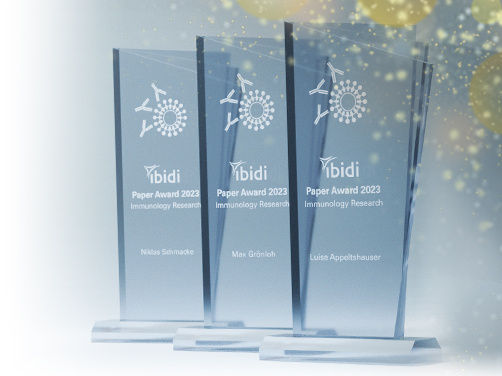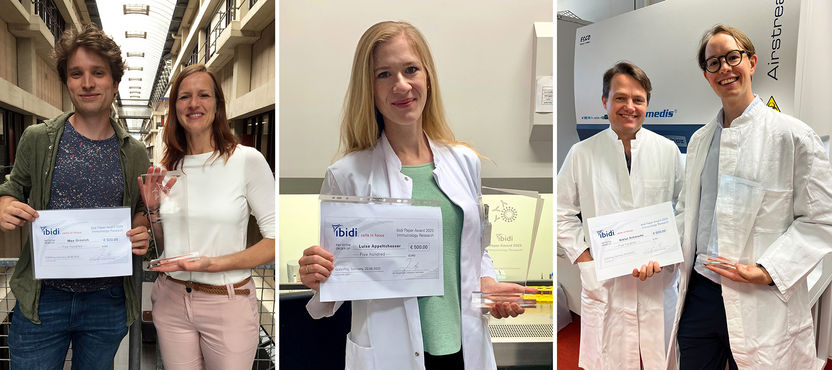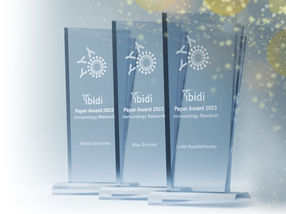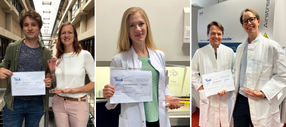ibidi Names the Winners of the 'ibidi Paper Award 2023' Research Prize
Biotech company ibidi GmbH, located in Gräfelfing, Germany, has just announced the winners of the ibidi Paper Award 2023, an award that honors publications (papers) from up-and-coming researchers that were printed this year in renowned, scientific journals. Max Grönloh, Luise Appeltshauser, and Niklas Schmacke were chosen for their innovative cell-research work in the field of immunology, with the help of ibidi products.

ibidi GmbH

Regional representatives from ibidi GmbH personally congratulated all the winners at their research institutes and presented them with specially designed trophies and a check for the prize money. From left to right: Max Grönloh, University Amsterdam, The Netherlands with Christiane Thanisch, ibidi GmbH; Luise Appeltshauser, University Würzburg, Germany; Niklas Schmacke (right) with his Mentor Prof. Veit Hornung (left), Gene Center München, Germany.
ibidi GmbH


The three prize recipients, working with their respective research groups, succeeded in developing special, living-cell experimental setups, which revealed crucial information about the body’s actual defense behavior. The young researchers combined their unique cell culture systems with advanced microscopy techniques to create brilliant cell images and videos. These provided valuable insights into the mechanisms of the immune systems, and the effects of various therapies.
This is the second time that ibidi GmbH has awarded this annual, global prize, which comes with a cash endowment. The company itself has received numerous awards as a fast-growing driver of innovation in the life sciences sector. With a different focus each year (the 2022 theme was cell-based cancer research), the ibidi Paper Award 2023 was created to highlight the need for far-sighted research on living cells, and to support a new generation of scientists.
To select the ibidi Paper Award 2023 winners, ibidi was honored once again to welcome a jury of three top experts—this time in the field of immunology. The panel searched through applications from a total of twelve countries on all continents, in order to identify research that could make the widest-reaching impact. They chose one Dutch and two German research groups, whose outstanding papers were accepted by the periodicals, “Brain,” “ EMBO Report,” and “Immunity,” which are some of the world’s most influential life sciences journals. Their results, which were achieved with the help of ibidi laboratory products, are on their way to being rapidly applied globally.
As ibidi knows, the goal of worldwide, scientific networking—though a collaboration of different disciplines—is to rapidly increase the knowledge of life, health maintenance, and the best methods for healing. The core of all life is the cell. The cell research fields of biology, chemistry, and physics are committed to understanding its building blocks and its inter- and intracellular action s. In addition, engineering and materials science, as well as electrical engineering, ensure the cell’s visibility. Through publications (papers), researchers are able to circulate their findings—after a rigorous application process—in renowned, high-impact journals. These discoveries are then used by academic and industrial laboratories to generate further progress in cell understanding.
Since its founding, ibidi has combined these varied disciplines to create suitable research “tools” for gaining a deeper understanding of cells in a lifelike environment. Over the years, the company has developed a large portfolio of over 450 locally-manufactured, patented laboratory products. They range from cell carriers for microscopy to devices that regulate the flow of active substances containing liquid-dissolved components (tumor cells in the bloodstream), as well as germs transported via the air (aerosols on mucous membranes). With the high viability of uses for ibidi’s innovative products, there are many helpful and yet-to-be-discovered applications, which include research into widespread diseases like cardiovascular events, cancer, and infections.
This year’s ibidi Paper Award 2023 honorees have taken further steps to better understand the cell in the field of immunology. Max Grönloh from the University of Amsterdam in the Netherlands, Luise Appeltshauser from the University of Würzburg in Germany, and Niklas Schmacke from the Gene Center Munich, Germany, have all studied the special properties that influence the human body’s response to pathogens, and other challenges of the immune system. The comprehensive study by Max Grönloh and his research group provides valuable insights into why some targeted therapies could have complicated and unexpected effects. Luise Appeltshauser and her co-authors succeeded in characterizing the assumed disease-causing antibodies of an autoimmune disease. Thanks to Niklas Schmacke and his colleagues,we now better understand the regulation of inflammatory processes, which is relevant to human disease and potential therapeutic interventions.






















































